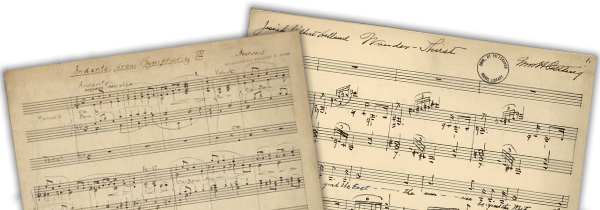Adolph M. Foerster’s Lyric Suite, op. 82, is an orchestral piece in four movements. A manuscript full score of movements 2 and 4 indicates that they were performed on August 5, 1921, on a concert of Foerster’s music at Willow Grove Park. The other pieces included on the concert were Festival March, Op. 32; Prelude to Faust, Op. 48; Hero and Leander, Op. 44; and the premiere of Nuptial Feast, Op. 85.
The movements of Lyric Suite are:
1. Autumn Wanderings
2. Air for the G String
3. Berceuse
